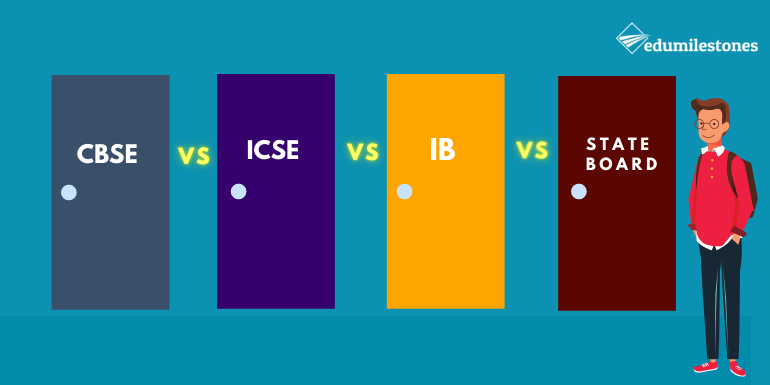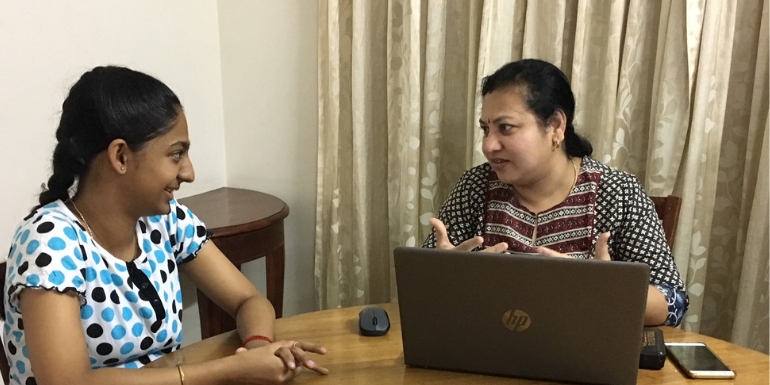With about 900 universities, 40000 colleges and about 15 lakh schools India has one of the largest education systems in the world. It is literally a buffet of choices. Whatever your skillset or career preference it has something to excite you. The Indian school system especially gives you a choice between multiple boards such as ICSE, IB, CBSE and the state board. And we know that making a choice from a long list of pros and cons can be difficult. Especially when this choice is going to decide how you spend the major portion of your life.
So we bring to you a list of things you should know about these boards and how each could help you shape your career better.
CBSE (Central Board of Secondary Education):
The brand ambassador of the Indian education system: CBSE, is a dominant board that most schools in every part of India offer. While it is the talk of the town it may or may not be the best choice of the border based on your skills or interests. Here are a few things to look at before choosing to study in a school with this board.
1. Curriculum:
The CBSE curriculum is strictly controlled and structured. This means that there is a set curriculum and a set bunch of subjects that students need to study. While it may seem boring the CBSE curriculum and the examination structure actually focuses a lot on the application of knowledge and skill-based learning to be better ready for your future job. The curriculum also prepares students to appear for any Indian competitive exam.
2. Levels of education:
For class 10 CBSE mandates 6 subjects such as English, Hindi, Mathematics, Science and Social Science and a vocational subject. In class 12, depending on the stream students are offered standard subjects such as physics, chemistry, biology and maths for science stream, business studies, accounts and economics for commerce stream.
3. Subjects offered:
CBSE offers students to choose from 7 focus areas at the secondary level viz. Humanities, Mathematics, Science and technology, Health and Physical Education, Visual and Performing Arts and Commerce. Hence while individual subjects available per focus area may vary from school to school, only these narrow focus areas are available.
4. Co-Curricular Activities:
This board encourages schools to help students develop themselves holistically and build skills in addition to the education they are getting. Most CBSE schools will offer platforms to learn or practice public speaking, entrepreneurship, sports, fine arts and music and even vocational skills. These schools will hence you give you at least a basic infrastructure to pursue a hobby.
5. Level of difficulty:
The level of difficulty of subjects and examinations of the CBSE board is much less as compared to other boards in the country. This is solely because it is mostly based around a fixed curriculum and the scoring system is also much lenient. Additionally, CBSE subjects are very straight forward and dont require you to explore a concept in much depth unlike boards like IB.
6. Teaching Methodology:
Since the curriculum is too straight forward and the assessments dont expect a person to explore but rely majorly on rote learning, the teaching pedagogy is also very simple. The methodology is hence very teacher-centric where a teacher breaks down a specific subject to “teach” the students withing the standard classroom setting.
7. Who should opt it:
If you’re planning on applying to a university within India for Engineering, Architecture or Medicine this is the best board to choose. Also if you feel like too much self-exploration when it comes to studies, is not your cup tea then this definitely is your board of choice.
IB (International Baccalaureate):
If CBSE is a pioneer of Indian education, IB is that of international education in India. IB schools across India are known to be prestigious institutions that are great for a child’s overall development but are expensive to enrol in. Quite obviously, everyone would love an international level education in their hometown but not everyone enrols in an IB program. Here are some reasons that could help you understand why you should or shouldn’t enroll in one:
1. Curriculum:
The IB prides itself on designing a curriculum that takes a student on an immersive journey into the subject matter of a topic. While it does have a set curriculum, all subjects are integrated into one other so that students can experience and learn apart from the standard classroom discussion. There is also no fixed textbook per se that is used as a baseline for the curriculum.
2. Levels of education:
Unlike the Indian board, IB has 3 levels of education were the focus of learning changes. The Primary Years Program (PYP) for 3-12 years focuses on building core knowledge and skills. The Middle Years Program (MYP) for 11-16-year-olds focuses on students learning the practical implications of what they learn. Finally, the Diploma Program for 16- 19-year-olds offers excellent depth of knowledge in the subjects that the student elects.As an alternative to the Diploma Program, the Career-related Program combines the DP studies with career-related subjects to help students prepare for their careers.
3. Subjects offered:
IB curriculum offers students to choose one subject each from 6 subject groups viz. studies in language and literature, language acquisition, individuals and societies, sciences, mathematics, and the arts. Students will take some of these subjects at a Higher Level (HL) and some at Standard Level (SL). Apart from these, there are 3 compulsory elements that make the DP core: Theory of Knowledge, the extended essay and creativity, activity, service.
4. Co-Curricular Activities:
Another thing that IB schools are proud of is their amazing infrastructure that promotes extracurricular activities. Be it sports, gymnastics, information technology, robotics, performing arts, pottery or public speaking, IB schools often integrate co-curricular activities into academics so as to allow a holistic development of the child.
5. Level of difficulty:
The IB curriculum is the most demanding education structure in this list. With year-round quizzes, presentations, assignments and internal assessments students are kept on their toes all the time. Also since IB doesnt have a term end exam structure but a continuous assessment one, it requires students to be constantly in touch with their learnings.
6. Teaching Methodology:
Teachers are often facilitators in the IB schools where they play an integral role in facilitating the exploration of a field but the student on their own. This implies that they use a combination of classroom learning, discussion groups and self-learning to help the students improve their sense of enquiry and decision making.
7. Who should opt it:
Anyone who loves to explore a field of learning without having to mug up a hundred pages is a perfect fit for IB. If you love getting your hand dirty while learning a subject then this is definitely for you. The IB curriculum also prepares you well for international education. So choosing an IB education may actually give you an added advantage over Indian counterparts while applying for foreign universities.
ICSE (Indian Certificate of Secondary Education)
Started in 1956, Council for the Indian School Certificate Examinations is the apex body of the ICSE. ICSE or as most Indians know: the substitute of CBSE used to be a popular choice of boards up until very recently when IB took over. ICSE has been a pioneer of high-level learnings and continues to develop its curricula and pedagogy to help students excel in academia and outside.
1. Curriculum:
While completely different from the CBSE curriculum, the structure is almost the same under ICSE. There are a set number of subjects and there is almost no choice in the selection of subjects. The curriculum is however much more detailed and complex. ICSE also adds compulsory SUPW or Socially Useful Productive Work projects to its bunch of subjects.
2. Levels of education:
Unlike CBSE, ICSE students are mandated to take up only 3 subjects in 10th viz. English, second language and History,Civics and Geography. Science, economics, mathematics, environmental science, computer applications, arts and physical education are the electives. In class 12, they are also divided into science, arts and commerce streams and subjects are similar to the CBSE class 12. The only difference here is that the class 12 subjects are taught at a much in-depth level than any other board.
3. Subjects offered:
With English as the first language, ICSE offers the same standard bunch of subjects such as Maths, History, Civics and Geography, Physics, Chemistry, Biology and a second language which usually is Hindi with some schools offering french as an option. Each subject has a 20% internal assessment weightage which is either internal exams or assignments or a combination of both.
4. Co-Curricular Activities:
Since ICSE does give higher importance to the balanced development of children in its schools than CBSE, most schools will offer co-curricular activities. Some schools also make it compulsory for students to enrol in these to help them pick up a new skill by creating a habit. Music, sports and public speaking are some common activities across ICSE schools. Apart from this social service, scouting, entrepreneurship-related activities and theatre are some other extracurricular activities that students could take up.
5. Level of difficulty:
Since subjects are much more complex than CBSE ones, the level of difficulty is one up. Also, the major dependence on rote learning and examinations of some subjects also testing the application of theories requires students to invest more time and efforts in each subject. Hence the complexity falls in between CBSE and IB.
6. Teaching Methodology:
The standard classroom teaching methodology is adopted by teachers in ICSE schools. However, classroom sessions are much more intense since the subjects are taught at a much higher level than CBSE or state boards. Classroom sessions may also be integrated with lab work or practical experimentation to give students an in-depth understanding of the subject matter of a topic.
7. Who should opt it:
ICSE is perfect for all kinds of students. It has the perfect balance of complex studies, overall grooming and extracurriculars. However, if you are inclined towards a career in Management or Humanities, this curriculum could give you a bigger advantage due to the complexity of learnings it takes you through and the heavy focus on language and communication in ICSE schools.
State Boards
The saviour of all students in this country, state boards as the name suggests are run by the individual states.
1. Curriculum:
The curriculum here is very localised. Every state has a very different curriculum but it is very rigid. The studies are also mostly related to the textbooks given and a slight variation to the NCERT books that CBSE follows.
2. Levels of education:
Just like the CBSE board, state boards offer 6 subjects to their students in class 10 and divide them into 3 streams in class 12. The difference here is that state boards have a very basic curriculum that gives students a bare minimum required information in every subject and nothing more.
3. Subjects offered:
State boards offer standard subjects such as match, science, history, geography, economics and the like. The choice of first language is different in each state and is usually the local language of the state along with English as a second language.
4. Co-Curricular Activities:
Infrastructure for co-curricular activities is mostly lacking in these schools. The focus is majorly on providing basic education to masses and hence extracurriculars is not something these schools encourage students to pick up. However, sports and music may be activities that some schools may offer to their students.
5. Level of difficulty:
Since the syllabus is very basic and examinations are based on rote learning, the level of difficulty here is very easy.
6. Teaching Methodology:
The teachings here are very simple and straightforward. Classroom lectures are the only media of delivery information and hence the bias towards rote learning.
7. Who should opt it:
If you have plans of pursuing your career where skills outside of school are more important then this is your choice of board. Most students who pick up SSC or HSC schools do that so that the educational pressure is low and they can work on the external skills required for the career of their choice.
The final verdict
When selecting a board of education, its best if the student decides which one suits their interests. If you love experiencing things or asking multiple questions to explore why a phenomenon happens then IB is the place to be. If you love working on your overall personality while solving complex textbook problems ICSE can be your choice of board. If applying to a university or stream of work in India is going to require you to crack an examination then CBSE and its math-based approaches could be helpful.
All in all, what you as a student now need to do is analyse these details about various boards and see which one will make your life easier. If you’re still confused you can visit us at www.edumilestones.com and we could help you choose the education that fits you the most!













